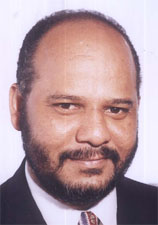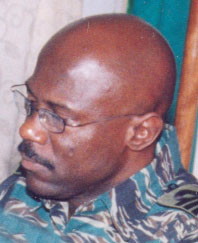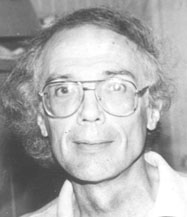The annual United States Department of State Report on Human Rights Practices usually triggers selective interpretation and hype from the state media and angry reactions from the Government of Guyana. This year has been no different. For wronged citizens, however, that report remains the best hope they have for alerting the international community to their plight and for advising the national government of the need to correct its policies.

March is the most merciless month of the year. It marks the start of the season when the United States Department of State relentlessly releases its series of annual international reports − the Report on Human Rights Practices issued by the Bureau of Democracy, Human Rights, and Labor; the International Narcotics Control Strategy Report, issued by the Bureau of International Narcotics and Law Enforcement Affairs; and the Trafficking in Persons Report, issued by the Office to Monitor and Combat Trafficking in Persons.
It has become a traditional time of shame, denial and recrimination for the administration and the state-owned information media in this country. Although the reports are accessible by anyone who wants to read them, the state media disingenuously, but dangerously, decide to report only the fragments which are favourable to the administration and ignore the rest. The result is an unbalanced and distorted version of reality. To delinquent schoolboys, headmasters’ reports might occasionally be unwelcome but it would be unwise to dismiss them or disregard their recommendations.
In commenting on this year’s Report on Human Rights Practices, the Government Information Agency, for example, goes no further than admitting blandly that “there were problems in some areas.” The agency then methodically attempts to paint a cheerful picture of the government’s attitude to its citizens’ human rights. It does so by extracting, line by line, those bits and pieces of the report which emphasise the administration’s adherence to the provisions of the law. Hence, for instance, it takes pains to highlight the non-involvement of the Government or its agents in politically-motivated killings and disappearances and to laud its respect for the freedom of speech, the press, movement, assembly and association and academic and religion freedoms.

The administration also takes the report seriously, albeit for the wrong reasons. Last year, annoyed at the Trafficking in Persons Report, Minister of Home Affairs Mr Clement Rohee who is chairman of Guyana’s Ministerial Task Force on Trafficking in Persons simply decided to write a local alternative but vacuous version. With strange reasoning, he argued “Too often we have external agencies of the donor community compiling reports on various phenomena in our country as if we Guyanese do not have the capacity and objectivity to compile such reports on our own.”
When President Bharrat Jagdeo delivered the feature address at the opening of the 3rd meeting of the African Caribbean and Pacific and the European Union Joint Parliamentary Assembly in late February this year, he resorted to the familiar pattern of rejection. Alluding to the Trafficking in Persons Report which placed Guyana on Tier 2, the president declared his determination to write to United States President Barack Obama to ask him to review the process of constructing the reports since they are misleading and “lecture the world rather than help.” The response to that correspondence would make interesting reading.

The president should be reminded that, in explaining its rationale for Guyana’s unfavourable ranking, the US placed emphasis not on the number of cases recorded but on the effort evinced to eradicate trafficking. The report stated clearly that “While the government has undertaken a commendable initiative to increase public awareness of the dangers of human trafficking through a nationwide outreach campaign and advertising of its anti-trafficking hotline, Guyana is placed on Tier 2 Watch List for a second consecutive year for failing to provide evidence of increasing efforts to combat trafficking, particularly in the area of law enforcement actions against trafficking offenders.”
Further, with respect to narco-trafficking, the president complained again that Guyana receives from the United States an average of US$ 30,000 per year to fight drug trafficking which is inadequate. To illustrate his point, he told his audience “Many of you earn more than that per year; that is the help we get to fight drug traffickers.” But it is misleading to see international aid as an entitlement. Instead, it should be seen as an investment to achieve specific targets. As former US ambassador Roland Bullen made clear some time ago, “For my government to invest more, it will need to see a greater return. Resources are success-driven and it is demoralising to see drug shipments originating in Guyana, seized abroad, while narco-criminals roam freely here.“

In the Report on Human Rights Practices released on 25th February this year, the most significant abuses included “potentially unlawful killings by police [and] mistreatment of suspects and detainees by the security forces,” among others. In this regard, the evidence suggests that both the Guyana Police Force and the Guyana Prison Service committed unlawful killings. In most cases the police reportedly shot the victims “while attempting to make an arrest or while a crime was being committed.” On some occasions, detainees have died in police custody.
Understandably, the three most egregious examples of extreme criminal violence in 2008 – the massacres at Lusignan, Bartica and Lindo Creek – which were all blamed on a single criminal gang, led eventually to police confrontations in which all of the suspects were slaughtered. Rather than solve the crimes, however, the killings compounded doubts about the official versions of the deaths.
The US report also called attention to the Guyana Defence Force’s involvement in the physical abuse of two of its own soldiers during interrogation sessions in December 2007. The force conducted an investigation and submitted its report to the Guyana Defence Board in 2008. The GDF Chief of Staff declared that the members of the force who were involved in the incident had been punished, but did not identify them or the penalties imposed. This newspaper published leaked sections of the report that implied that the victims did indeed suffer severe pain as a result of the methods employed to extract information from them. Separate allegations of torture made by other persons from the Buxton-Friendship community against military personnel have not been investigated. A full account is still to be given for these alleged abuses.

There is every reason why the Report on Human Rights Practices should be taken seriously by the administration and, particularly its principal law enforcement and security arms and agencies – the Guyana Police Force and the Guyana Defence Force. The report concerns not merely the suppression of crime but, moreso, the safety of the individual. It is also a useful gauge to determine whether life is worth living in this country and whether conditions will either attract or repel potential investors and visitors. As the president complained and the US ambassador suggested, unfavourable reports will invariably result in reduced foreign financial assistance.
The primary goal of the Report on Human Rights Practices should be to examine human security, that is, the protection of people from critical and pervasive threats and situations and the preservation of vital freedoms. It also discusses the systems needed to ensure people’s ability to live in dignity.
The report presents a different perspective by emphasising individual human rights. In the past, government policy has been concerned with national security that focuses on protecting the state from internal terrorism and from external aggression. Secure states, however, do not automatically mean secure citizens. Human security is about protecting individuals and communities from any form of political violence that might arise from socio-economic inequity, poverty, political persecution and racial discrimination regardless of the country’s safety from foreign attack. This is what makes the report important to Guyanese citizens.
There is certainly no shortage of legislation against shooting suspects. The problems lie largely with the failure of the law enforcement agencies and the criminal justice system to implement the law. Both the police force and the magistracy need to protect citizens and promote human security by ensuring implementation of the law.
Inevitably in reports such as these, criticism will be directed at the Guyana Police Force. Admittedly, insufficient staffing, inappropriate training, inadequate equipment, and acute budgetary constraints severely limit the force’s effectiveness. It is a fact, however, that the police are indeed responsible for several unlawful killings and, according to the report, were seldom prosecuted for them. This has eroded public confidence in, and cooperation with, the police force. To correct this, the administration needs to ensure that inquests and inquiries are held and that culpable persons are punished whenever these killings occur.
There is no reason for the US Department of State to repeatedly criticise the Government of Guyana for non-existent breaches while giving other Caribbean countries higher rankings. So, this country can too without the hype from the state media and the irritable reactions from state officials. What it needs is hope that, from year to year, the administration will tackle the real human rights abuses and, as a result, the US reports could get better.





